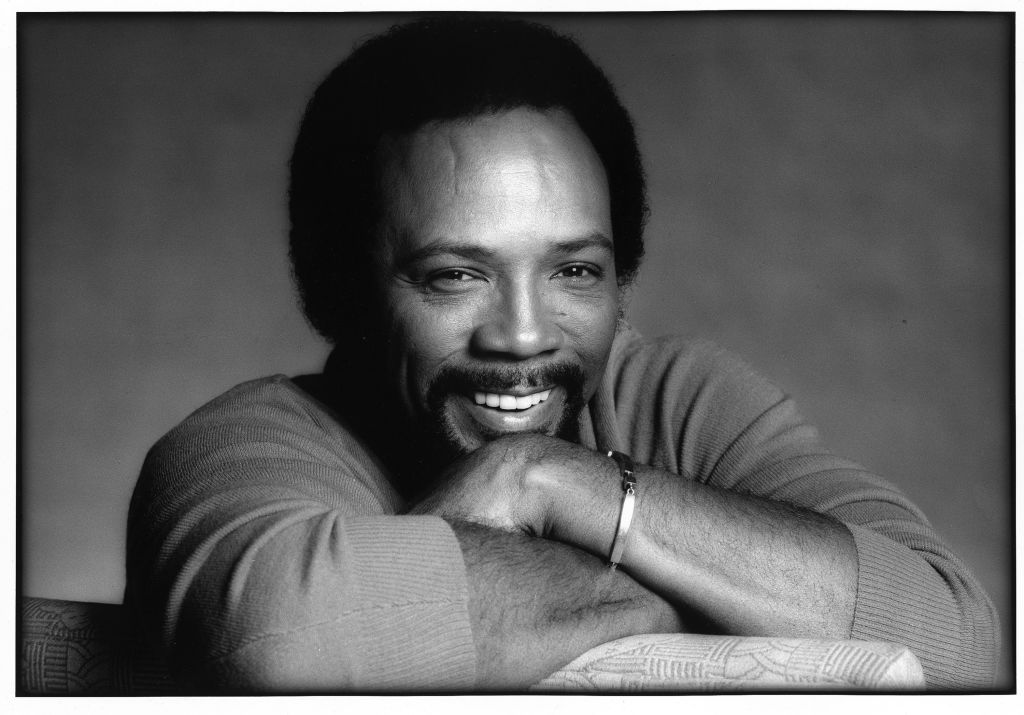Quincy Jones Gave Us The World. He Deserves All Of Our Praise. All Of Our Gratitude.

Source: Arnold Turner / Getty
Quincy Jones. Quincy Jones.
Born in Chicago, the City of Big Shoulders, on the South Side, he was the great-grandchild of a woman who had been enslaved and whose grandmother had been born on the Tennessee plantation owned by a Welsh man. That man also claimed ownership of both mother and child.
The child, Jones’s grandmother had an origin story that was horrifically common: she was the child of rape. She would go on to give birth to Jones’s father, who would have two sons with his wife. The first one entered the world on March 14th, 1933, and bore his daddy’s name: Quincy Delight Jones.
Imagine the love of a woman, the child of rape, who bears her own baby and chooses Delight to center her baby’s name. Delight: a Black, beautiful and beloved name for hope. It fit both men, Daddy the baseball player and holy-sounding in the work he did to sustain his family: carpentry.
And of course, baby. Singular, incomparable and held holy-like in the hearts of people across the globe, from the highly to the most humbly placed. In the coming hours and days, others far more qualified than I will detail the exquisite contours of the majestic career of a man who arrived on that clear, bright Midwest March day. They will surely better walk people through the stunning artistry of the man who was told he wouldn’t take the final step to even glimpse at his 40th year alive.
That was in 1974. Following a series of strokes, Quincy was supposed to die. His death seemed so imminent that he organized his own memorial service, which apparently sent the Grim Reaper scrambling for cover. He didn’t have the courage to come back around until yesterday, Nov. 3, 2024. Quincy Delight Jones drew his last breath at age 91, surrounded by a loving family.
I will share just one of the reasons tears gathered in my eyes at just about 3:00 this morning on the East Coast. Quincy Jones helped give me a world in which I found place.
None of the criticism that surrounded We Are the World when it premiered in March of ’85 landed on baby teenager me. I probably didn’t even know it was out there until sometime in the 2000s. The song, written by Lionel Richie and Michael Jackson, and produced and orchestrated by Jones, first gathered together what seemed like the most talented and popular group of artists at the time. Then they gathered us. Young people who were stretching so hard to reach our young adulthood.
The only stark absence was Prince’s (predictably?). He didn’t show up for the video shoot and recording that began in secret after 11 PM in L.A. on Jan. 22, 1985.
On July 13 of that year, We Are the World concerts were held around the world simultaneously. Some of my generation–names withheld to protect the reckless–even lied to their parents and slept outside on the streets in front of JFK stadium to get good seating at the ticketed but open-seating event.
No plot twist here: Harry Belafonte was the one who approached Jones about the war-created famine in the Horn of Africa. He apparently told Quincy they needed to do something to support the people of Ethiopia. They were dying, and photojournalists were leaving painfully malnourished children to perish in the road, flies circling above. Vultures too.
In some ways, for my friends and I, it landed as the genocide in Gaza has on my daughter’s generation: shocking, untenable, and a call to action.
We didn’t have social media then. We barely had cable. In my own home, my parents didn’t even have color TV, not that we were allowed to even watch TV. But we had music, 12″ recordings. And we had artists who were celebrities because of their artistic, not bedroom, talent.
And their coming together when Quincy called that We Are the World year, helped shape my entire life—from writing and organizing to parenting and loving. At the heart of me is a woman who was once a girl who committed fully to doing her best to help ensure human rights, to never turn away from suffering and injustice, and to do what I could to end it. I’ve done my best to honor that girl, although admittedly, sometimes my best actually was bad.
In 1993, Quincy Jones, in partnership with Time, Inc., created Vibe magazine. It became a Bible for nearly a full generation of those who claimed proud citizenship in what was called the Hip Hop Nation. Quincy tapped Keith Clinkscales, a young Black man not even 30 at the time, to serve as its founding president and CEO. No Black person had held such a position at the venerable publisher before.
This morning, Keith shared quietly that, more than anything, he felt gratitude for his early mentor, whom he loved. He was choosing to celebrate the majesty of his life. “How often do we get to see a Black man–any Black man–in America live to see 80, let alone 90? How often do we get to see them use their entire lives making our entire lives, better? We saw that with Quincy. He was blessed by God,” Keith said. And that Quincy Delight Jones took that blessing and gave it to each one of us.
For that, let us all say thank you, Mr. Jones. Let us all tip our hats and raise a fist in the air. And let us all say, Bravo Quincy Jones! Bravo!!!
See Also:
The Godfather Of Black Music: 15 Ways Clarence Avant Influenced The Music Industry
Hold Up, Wait A Minute! Quincy Jones Says He Dated Ivanka Trump


Post a Comment
0 Comments